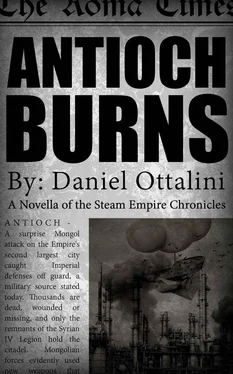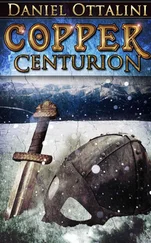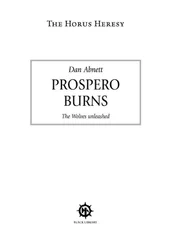Daniel Ottalini - Antioch Burns
Здесь есть возможность читать онлайн «Daniel Ottalini - Antioch Burns» весь текст электронной книги совершенно бесплатно (целиком полную версию без сокращений). В некоторых случаях можно слушать аудио, скачать через торрент в формате fb2 и присутствует краткое содержание. Год выпуска: 2014, ISBN: 2014, Издательство: Heart Ally Books, Жанр: Альтернативная история, на английском языке. Описание произведения, (предисловие) а так же отзывы посетителей доступны на портале библиотеки ЛибКат.
- Название:Antioch Burns
- Автор:
- Издательство:Heart Ally Books
- Жанр:
- Год:2014
- ISBN:9780985374099
- Рейтинг книги:5 / 5. Голосов: 1
-
Избранное:Добавить в избранное
- Отзывы:
-
Ваша оценка:
- 100
- 1
- 2
- 3
- 4
- 5
Antioch Burns: краткое содержание, описание и аннотация
Предлагаем к чтению аннотацию, описание, краткое содержание или предисловие (зависит от того, что написал сам автор книги «Antioch Burns»). Если вы не нашли необходимую информацию о книге — напишите в комментариях, мы постараемся отыскать её.
Antioch Burns — читать онлайн бесплатно полную книгу (весь текст) целиком
Ниже представлен текст книги, разбитый по страницам. Система сохранения места последней прочитанной страницы, позволяет с удобством читать онлайн бесплатно книгу «Antioch Burns», без необходимости каждый раз заново искать на чём Вы остановились. Поставьте закладку, и сможете в любой момент перейти на страницу, на которой закончили чтение.
Интервал:
Закладка:
Daniel Ottalini
Antioch Burns
Dear Reader,
The following text is a narrative account of the events occurring during the siege of Antiochia by the Mongol Invasion Force in the 1854 th year of the Christian Lord. This is one of the few confirmed documents on file about the fall of Antioch. All attempts have been made to verify the facts of this report. Until further witnesses come forward or more evidence is discovered, I fear that this is the most we will ever know about the fateful events surrounding one of the bloodiest periods in Rome’s history.
Signed,
Dannelus Ottalinia
Senior Transcriber amp; Historian Emeritus
Byzantium College of Warfare
August 1, 1862
Day One: The Merchant’s Tale
The countryside flew by at a prodigious rate, the horses of the auxilia scouting unit eating up the leagues of rolling hills and farmland. The double score of men rode two abreast, sunlight shining off their scale armor. The detachment of horsemen sent up a thin cloud of dust from the dirt road as they crested a low rise, their leader reining in his steed. Decanus Marius Quinctius Regillus reached into his saddlebag and pulled out a map. He traced their route with his gloved finger.
“According to the merchant’s report, he saw the burning villas down this way. He also said there was a lot of Easterner cavalry. Probably one of those damnable tribal disputes lighting up again,” Regillus quipped to his auxilia . “But still, orders are orders. Let’s check it out. Eyes open, sing out if you see anything.”
Out here on the eastern border of the Imperial Roman Empire, the massed cavalry forces of the Mongolian Khannates were the main threat, and the Romans had been forced to develop their forces in kind. The boys originally drafted from the cities and towns were no match for the veteran steppe riders. Most of these boys had not survived the first Roman-Mongolian War. Those that did were tough, wily, and exceptionally tricky to lead. But once you gained their trust and fellowship, the bond was unbreakable.
Regillus was different. The youngest son of Senator Quinctius Janus Regillus was nobly born, more the scholar than soldier. The fact that he had survived the two years of brutal, no-holds-barred warfare spoke to his skill and tenacity. That he rose in rank to lead an auxilia detachment, the ground based eyes and ears of the Roman Army, spoke to his intelligence. That he had done so without ‘buying in’ to a higher rank, as many of his peers had, revealed his character. Regardless of his background, his men respected him for those two reasons. He would not throw their lives away needlessly, and he was smart enough to not pretend to know everything. Many soldiers could not count themselves so lucky in their leadership.
Regillus guided his men off the dirt roadway, to better mask their dust cloud as they approached the supposed scene of the attack. They rode through the field, trampling the high crops with impunity. Finally, the horsemen crested a short rise, and the officer reined his men in.
“In the name of Jupiter Magnus…” Regillus’ jaw dropped, gaping at the sight laid out before him. Further down the valley, a massive tent city filled several huge tracts of farmland. The dome shaped huts of the Mongols had grown like mushrooms overnight. Banners flapped in the wind, too many to count. The rich smell of manure, horses, and trampled crops registered with the officer as he motioned to his men to dismount. The cavalrymen spread out to form a loose perimeter, their folding repeaters locked into place, wire stocks nestled into shoulders, fingers on the trigger. They scanned the fields of rippling crops and occasional rocky hills with nervous eyes. They too had seen the substantial enemy army encamped in the valley in the distance.
Regillus’ second in command, Limes Vegiutus, walked up beside his commander, pushing vegetation out of his way.
“Sir? What should we do?”
“Hopefully they have yet to see our dust cloud, but I would not count on it.” He told his junior officer. “Looks like that merchant was right.”
He pushed his way though the crops and back onto the road. He could track the motion of his men through the wheat as they moved to the edge of the cover. Just beyond the field lay the Via Thapsacus, the main trade route leading northeast towards Mongolian territory.
Removing his helm, Regillus caught sight of the slightly blurry black and white photograph of his family nestled amongst the interior webbing of his helmet. He paused, said a quick prayer to his gods, then handed the shining galea to one of his men, before crouching low and running across the road. He found shelter besides a few scraggly roadside bushes to get a better view of the land. Beckoning to his junior officer, he crouched down in the soil. Vegiutus joined him after copying his experienced commander’s movements. Lifting the binoculars to his face, he spoke in a low, rapid voice; Vegiutus scribbled down his observations.
“At least 60,000 men probably. Appears to be two thirds horse archers, but they’ve got some infantry guarding those covered wagons. I would wager ten good denarii that it holds some type of artillery train.” He scanned the position, looking for the pickets. He cursed as he noticed the camp beginning to stir. Some type of chief was waving his hands and pointing to their position.
“They’ve spotted our dust cloud. We’re in trouble. Run back to the horses and get that report onto a messenger pigeon. Antiochia must know about this and mobilize their forces. I don’t see how any of the border defenses could hold them back, but surely some word must have gotten out.” He mused, brain in overdrive as he analyzed the situation.
“Sir?” Vegiutus asked, nervously licking his dry lips. He looked a bit pale in the hot sun, the prospect of soldiering far less exciting when faced with a real, live enemy.
“You’re still here?” Regillus said sternly. Vegiutus scurried back across the road. What did I do to get stuck with the general’s cousin? Poor kid can barely stomach the sight of these barbarians, and we’re a good two miles or so away.
He made his way back to the horses, jogging now, the sweat from the hot day trickling down his back and sides. He twirled his finger in a loop, silently directing his men. His auxilia quickly mounted up, and they wheeled around, galloping back through the field and onto the road.
“We must put some distance on them, then pull back on the horses. We don’t want them to go lame.” He shouted at Vegiutus, who nodded and signaled the rest of the men. The column raced along the roads. Their dust cloud formed a long, wavering tail behind them. Regillus could care less who spotted them now. Speed was of the essence. How had they gotten past the border forts? What about the other border cities?
“How do you think they did it, sir?” Vegiutus shouted to him. He looked scared. He’s probably never actually seen a real easterner before , Regillus realized.
“They must have figured out how to bypass the forts or neutralize them somehow!” he called back. They were approaching the first of many small settlements that speckled the valleys northeast of the city. He stopped his horse, his men sawing abruptly at their reins. A scene of devastation met their arrival.
“This can only mean one thing,” he told his green-faced junior officer, “the easterners have gotten behind us and are already loose. We must make it to Antioch and warn the city.”
“But sir, we sent ahead the messe-“
Regillus made a chopping motion in the air with his hand, interrupting his younger companion.
“And we know that Mongols are crack shots with those horsebows of theirs. Plus they’re fast riders and eagle eyed. If there are raiders about, I give that bird only one chance in five it will reach Antioch.”
Читать дальшеИнтервал:
Закладка:
Похожие книги на «Antioch Burns»
Представляем Вашему вниманию похожие книги на «Antioch Burns» списком для выбора. Мы отобрали схожую по названию и смыслу литературу в надежде предоставить читателям больше вариантов отыскать новые, интересные, ещё непрочитанные произведения.
Обсуждение, отзывы о книге «Antioch Burns» и просто собственные мнения читателей. Оставьте ваши комментарии, напишите, что Вы думаете о произведении, его смысле или главных героях. Укажите что конкретно понравилось, а что нет, и почему Вы так считаете.











